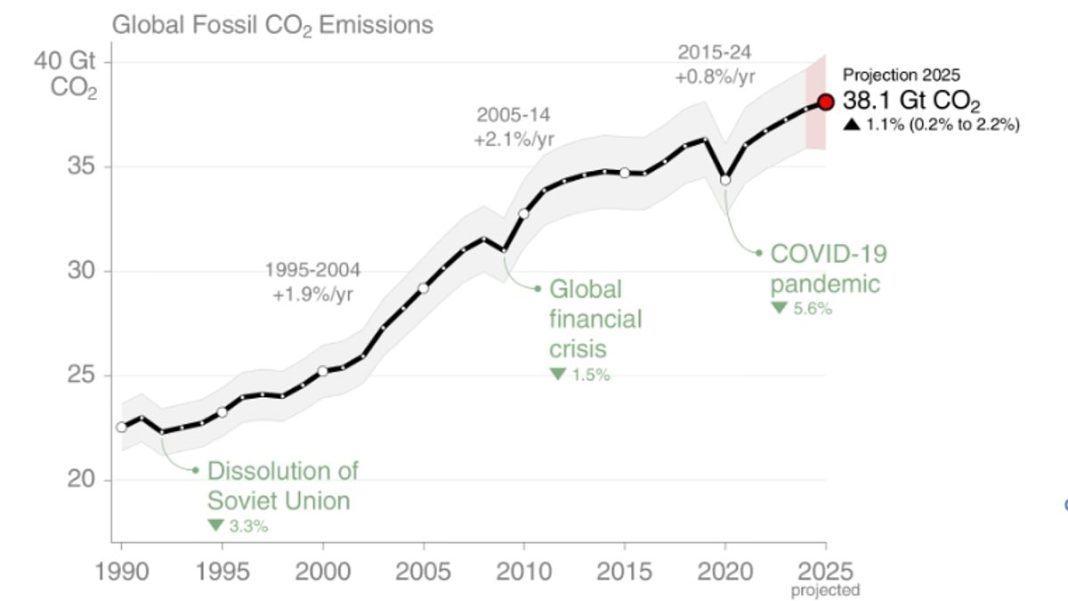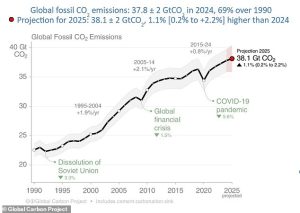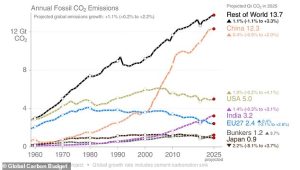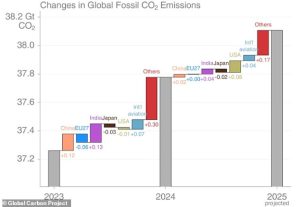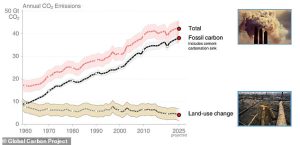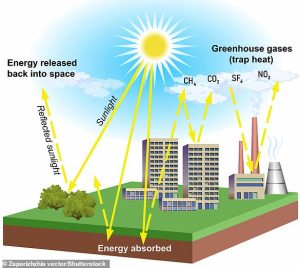Carbon Emissions From Fossil Fuels Set to Reach Record High in 2025
Global carbon dioxide emissions from fossil fuels are projected to hit a record 38.1 billion tonnes in 2025, rising 1.1% from 2024, according to the latest Global Carbon Budget report. This increase makes the Paris Agreement’s 1.5°C warming limit “no longer plausible,” scientists warn.
Key Takeaways
- Fossil CO2 emissions to reach 38.1 billion tonnes in 2025
- 1.1% increase driven by coal, oil, and natural gas
- 35 countries are reducing emissions while growing economies
- Land-use change adds 4.1 billion tonnes more CO2
Record Emissions Despite Climate Efforts
The 20th annual Global Carbon Budget report, produced by over 130 international scientists, reveals fossil fuel emissions continue their relentless rise. Lead author Professor Pierre Friedlingstein stated: “With CO2 emissions still increasing, keeping global warming below 1.5°C is no longer plausible.”
Study author Glen Peters from CICERO Center for International Climate Research emphasized: “It is clear countries need to lift their game. We now have strong evidence that clean technologies help reduce emissions while being cost effective compared to fossil alternatives.”
Country-by-Country Breakdown
China remains the world’s largest emitter at 12.3 billion tonnes, with projected growth of 0.4% in 2025 – slower than recent years due to moderate energy consumption growth and extraordinary renewable energy expansion.
India’s emissions are projected to increase by 1.4%, also slower than recent trends, partly due to an early monsoon reducing cooling requirements and strong renewable growth limiting coal consumption.
The US shows a 1.9% emissions increase, while the EU projects 0.4% growth. Japan’s emissions decline by 2.2%, continuing recent trends.
The Complete Carbon Picture
Beyond fossil fuels, land-use change contributes an additional 4.1 billion tonnes of CO2 emissions, primarily from deforestation. The combined total of 42.2 billion tonnes represents a slight decrease of 0.1 billion tonnes from 2024, using revised methodology.
“Progress is still much too fragile to translate into the sustained decreases in global emissions needed to tackle climate change,” said co-author Professor Corinne Le Quéré at the University of East Anglia.
Understanding the Greenhouse Effect
Carbon dioxide and other greenhouse gases act as an insulating blanket around Earth, trapping heat that would otherwise escape into space. While some greenhouse effect is natural, human emissions from burning fossil fuels, deforestation, and industrial processes have intensified this warming to dangerous levels.
The 2025 Global Carbon Budget report is published in Earth System Science Data as a pre-print, with an accompanying Nature paper examining climate impacts on carbon sinks.


